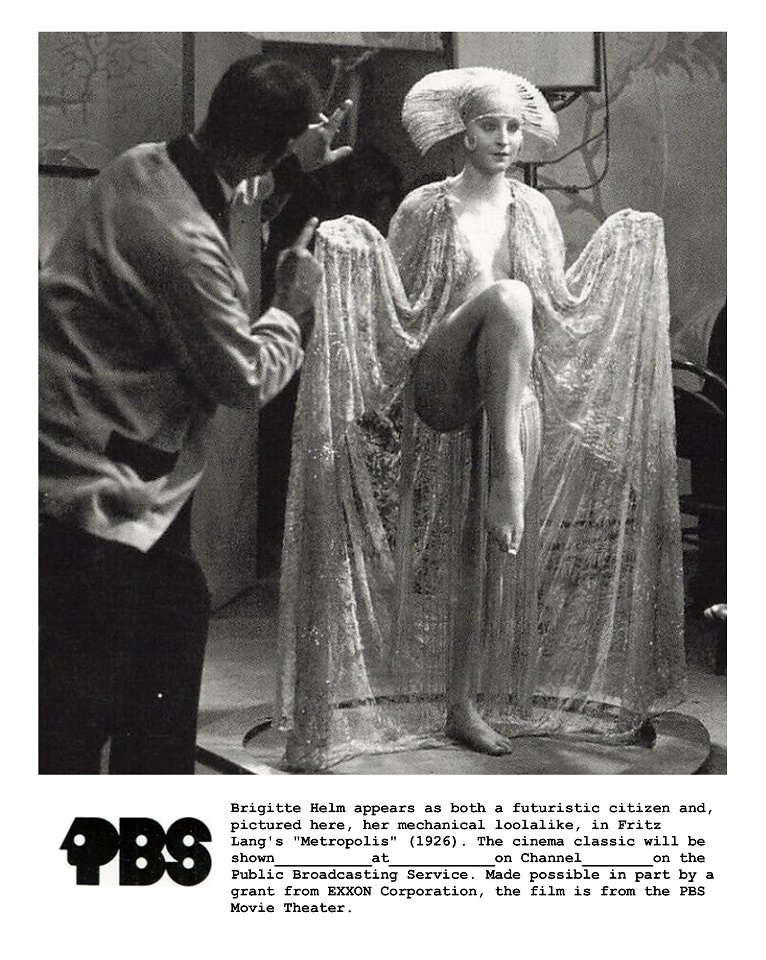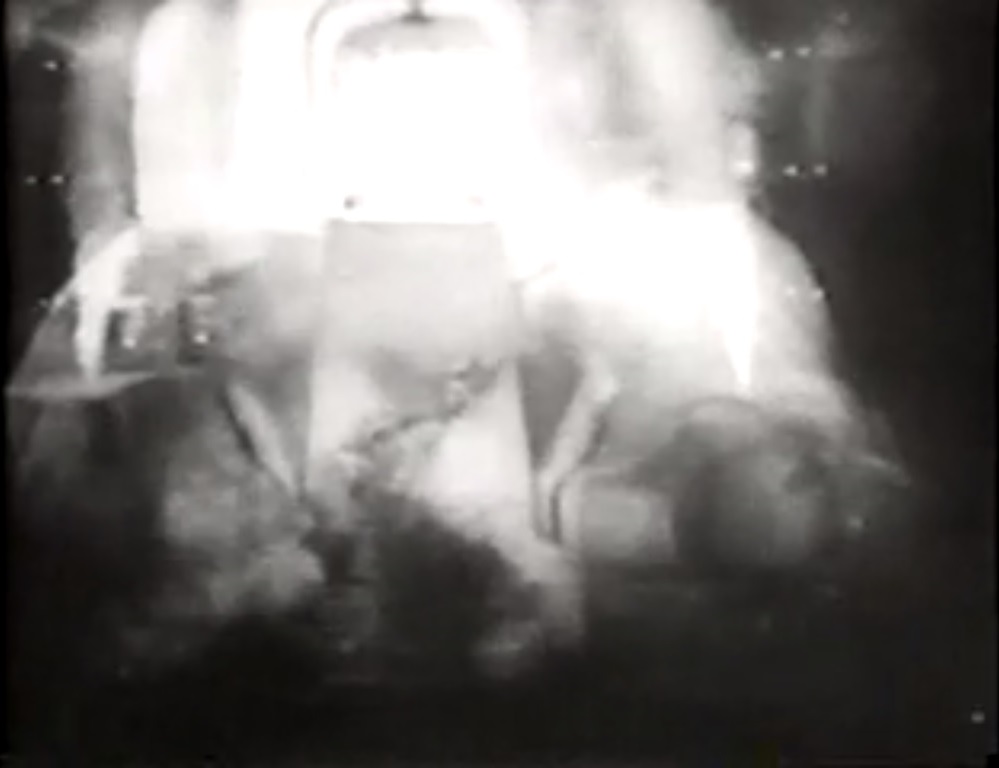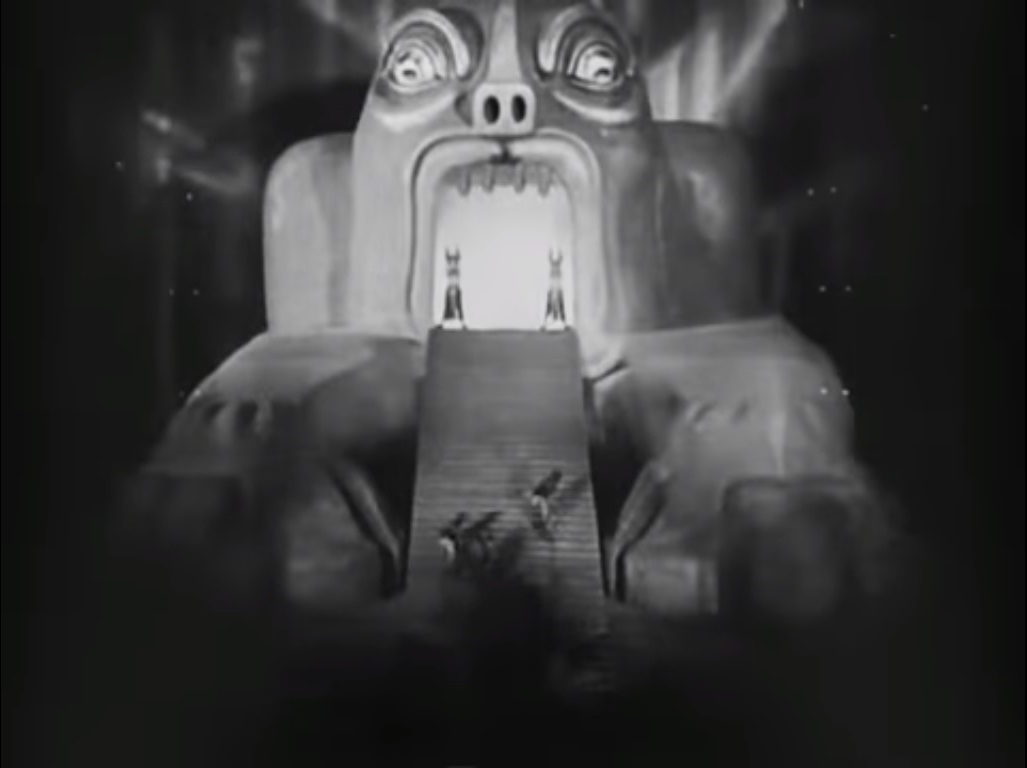A Few Notes about Metropolis and Pandora’s Box
When
METROPOLIS

This is my forgery of the press photo, based upon several sources.
I’m certain that it almost exactly matches the original.
Was on PBS
|
Sorry about the choppy opening.
Ted Obrien recorded Metropolis on VHS in December 1978,
but he made the mistake of not hitting the RECORD button until just as the movie began.
Sorry about the degraded quality of the last 3 minutes.
The movie was wrongly announced as “2 hr.” and so Ted inserted a
|
|
NOTE TO AUDIENCES: When you buy a ticket to see Metropolis,
or when you pick up a video copy of Metropolis,
you really don’t know what you’re getting,
because no two copies of this movie are at all alike.
Some copies are so horrid that they are unwatchable,
with inappropriate music or with no music at all.
Other copies are dazzling and breathtaking.
They are not the same at all.
After more than four decades of tossing and turning,
I decided to figure out why.
How did Metropolis migrate from 1926 to 2023?
Precisely how many times was it beaten to a bloody pulp along the way, and who were the perps?
What are we seeing, and why?
|
 A public-domain version. |
 A licensed version. |
|
NOTE TO SCHOLARS AND ARCHIVISTS: The 2010 restoration of Metropolis is missing extant material.
Check the Pathéscope 9.5mm prints from December 1931,
which have several shots in the dance scene that are missing from all other copies.
Check the 16mm print that Brandon Films distributed in 1954 and 1955, if you can find it.
Brandon licensed it from the US Office of Alien Property,
and it seems it had been copied from the Wardour print shown at the Marble Arch Pavilion in March 1927
(the dance scene was in Reel 8 rather than in Reel 6).
That print must still be around somewhere.
It would also be worth reviewing
BFI items
|
There’s probably almost nobody who remembers this,
but once upon a time, long long ago,
PBS had a weekly series called
“PBS Movie Theater.”
On that series was a broadcast of Metropolis, and that was my introduction to the movie.
I would soon learn that the edition shown on “PBS Movie Theater”
was different from any other version of the film available in the US, then or now.
It was rather rare even in Europe.

This is my forgery of the press photo, based upon several sources.
I’m certain that it almost exactly matches the original.
That’s not the beginning of the story, though;
that’s the middle of the story.
Let us not begin the story in the middle!
Let us start at the beginning.
Well, let’s start the story at the beginning, but with a tiny preview of coming attractions:
Everything you have heard about this movie —
its year-and-a-half shooting schedule,
its 36,000 extras,
its astronomical budget that bankrupted the studio,
Goebbels being so impressed by the film that he offered Fritz Lang control over the German film industry,
Fritz’s flight that very night to escape his fate —
and plenty other such tall tales, well, they’re all just a bunch of tall tales.
The true stories have long been easily available in the published record,
but some people just prefer sensationalism to facts.
By the way, I just discovered that Michael Organ’s Metropolis blog is up and running again:
https://metropolis1927archive.blogspot.com/.
Lots of good information there.
| Contents |
01 —
1926: Where It All Started |
02 —
Dec 1926: Paramount’s Regrettable Ideas |
03 —
Aug 1927: Québec |
04 —
Feb 1927: Paramount Slashes the Export Negative, Too |
05 —
1927: France |
06 —
1927: Sweden |
07 —
1927: Belgium |
08 —
Nov 1927: Italy |
09 —
Nov 1927: Turkey |
10 —
Apr 1928: Australia |
11 —
May 1928, Argentina |
12 —
Jun 1928: New Zealand |
13 —
Aug 1927: Ufa Copycats Paramount |
14 —
Dec 1931: Pathéscope |
15 —
Aug 1936: Iris Barry |
16 —
Jul 1948: The British Reissue |
17 —
Jun 1952: The Australian Reissue |
18 —
Cropping |
19 —
1 January 1953 Was Really 1 January 1955 |
20 —
Jan 1955: Brandon Films and the 55th St. Playhouse |
21 —
Aug 1957: The Anzac |
22 —
1960: Griggs Moviedrome |
23 —
Mar 1963: The Nordwestdeutscher Filmverleih (NWDF) Edition |
24 —
1965: The Revised Nordwestdeutscher Filmverleih (NWDF) Edition |
25 —
Piecing the Puzzle Together |
26 —
Jul 1967: The Anzac |
27 —
Sep 1970: The Toy That Grew Up |
28 —
1971: Behind the Iron Curtain |
29 —
May 1972: Janus Films |
30 —
1972: Thunderbird Films |
31 —
Jun 1972: The Eckart Jahnke (“FIAF”) Edition |
32 —
Aug 1975: BBC2 “Tuesday Cinema” |
33 —
May 1977: PBS Movie Theater |
34 —
Jul 1977: The Janus Edition Comes to Albuquerque |
35 —
8mm, Super 8, and 16mm Home Editions |
36 —
Beta and VHS and VCD |
37 —
1983: The Electronic Metropolis |
38 —
Confusion |
39 —
The Metropolis Family Tree |
40 —
May 1984: Giorgio Moroder |
41 —
Oct 1986: The Anzac |
42 —
Shopping for a Video That Did Not Exist |
43 —
Can We Find the BBC2/PBS Version? |
44 —
Can We Find the May 1972 Janus Films Version? |
45 —
2001: The Munich Reconstruction |
46 —
2005: New Zealand Redux |
47 —
2008: Argentina Redux |
48 —
Feb 2010: Restoration Redux |
SUP —
Dec 1977: When Pandora’s Box Was on PBS |